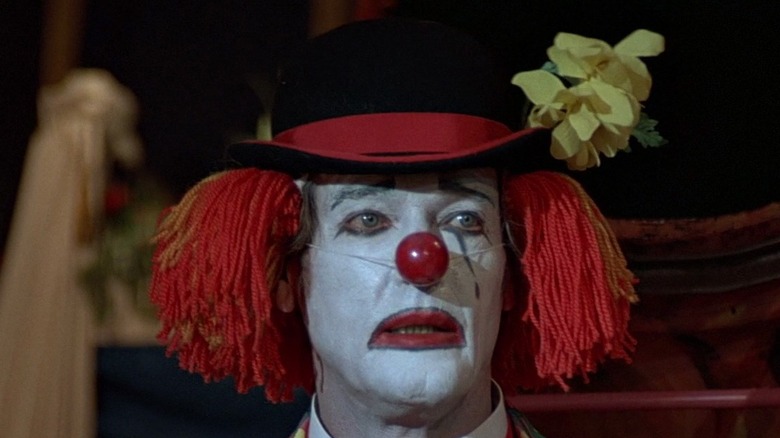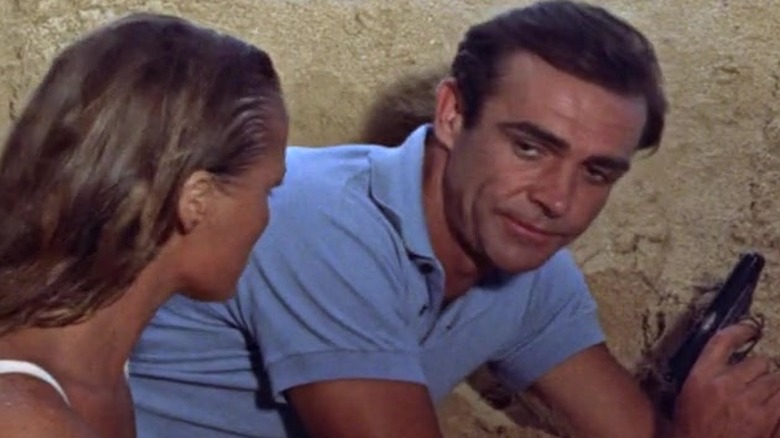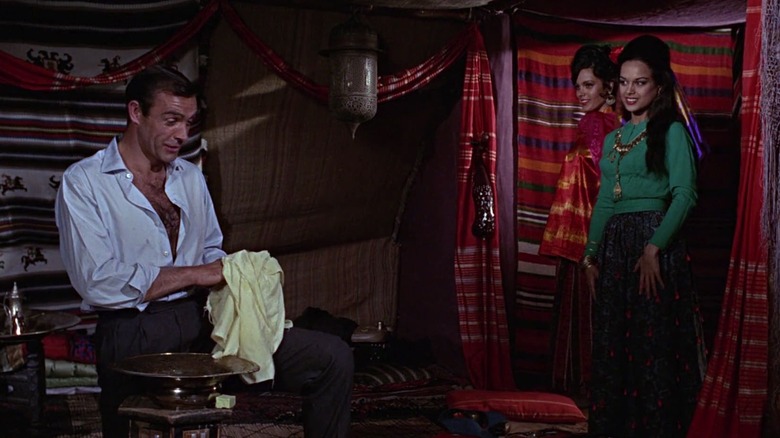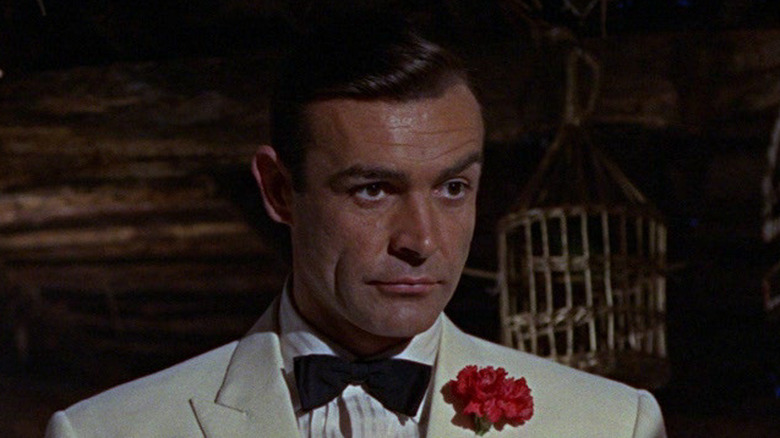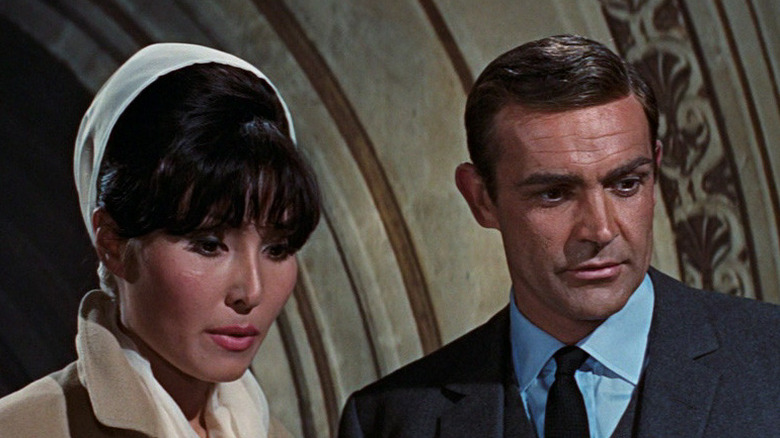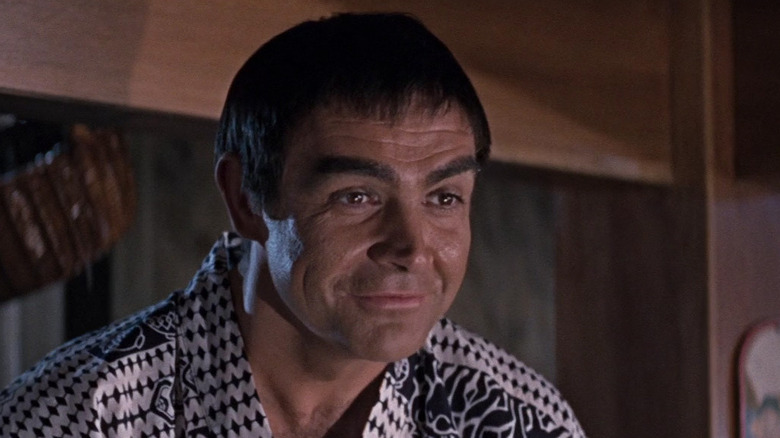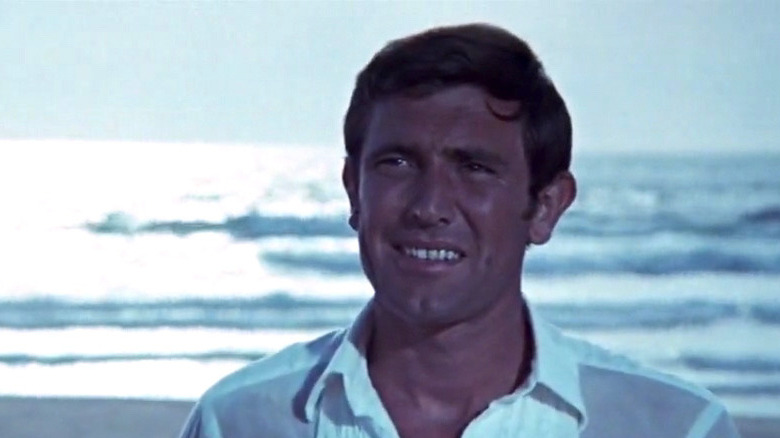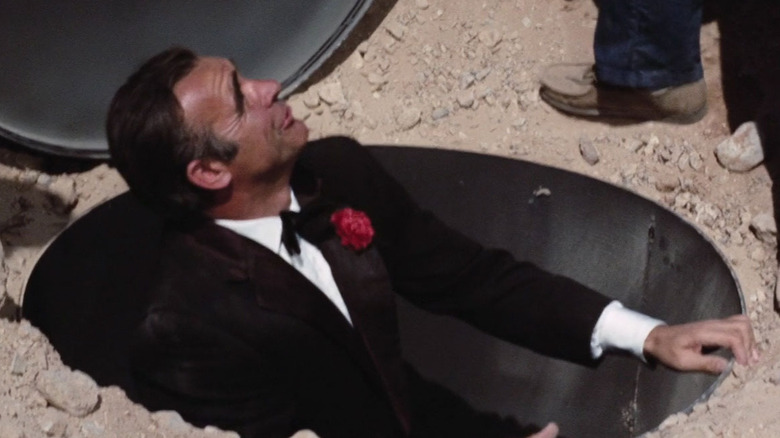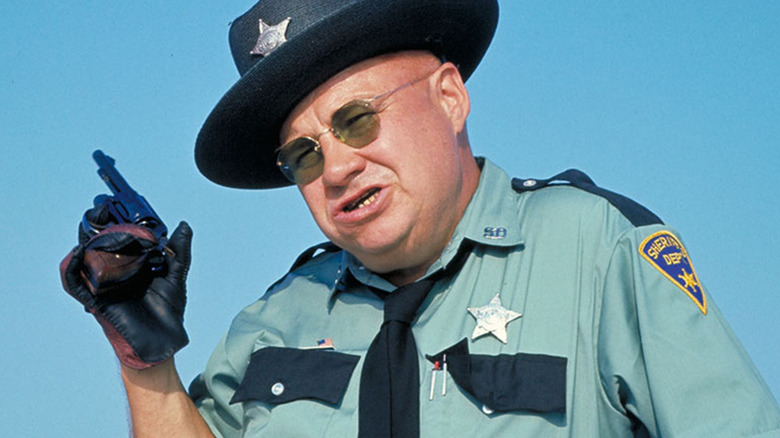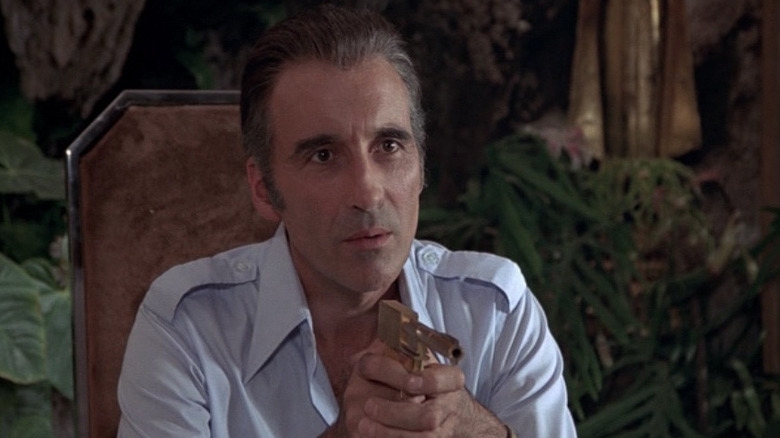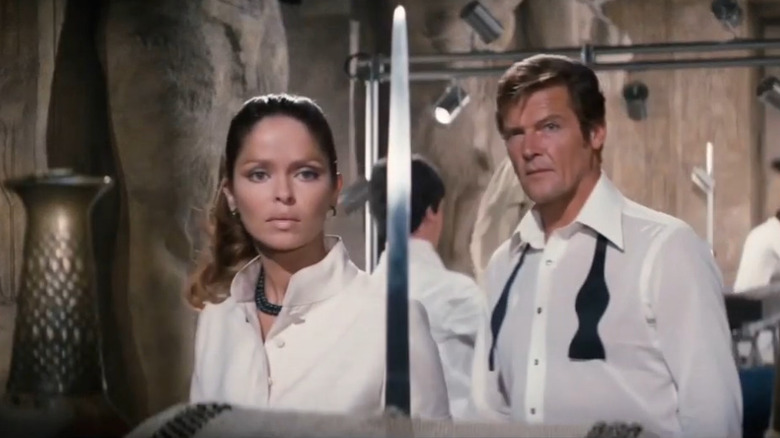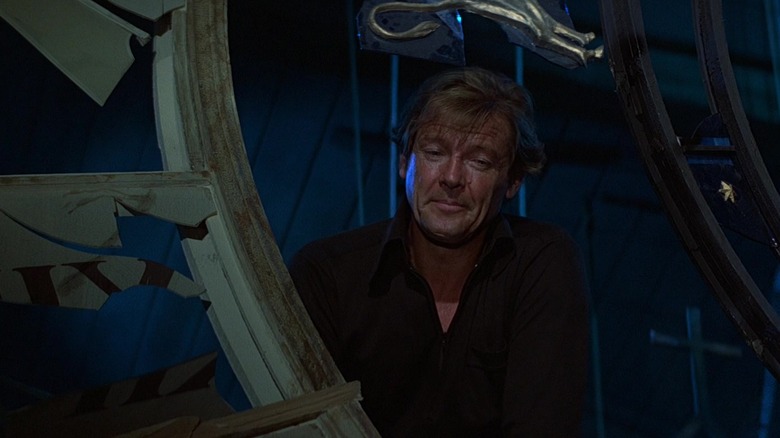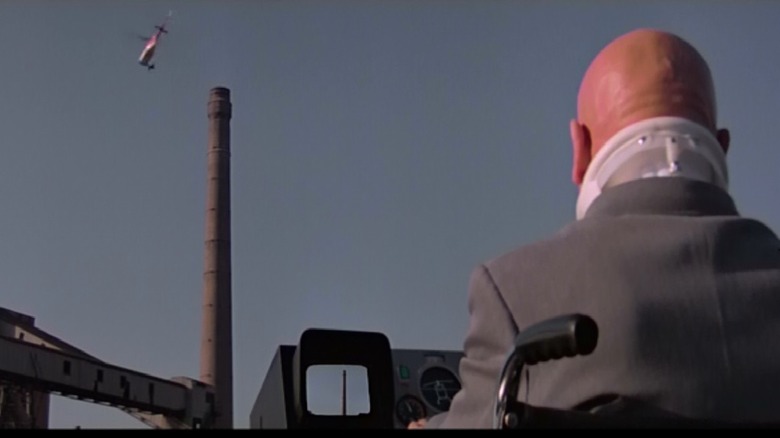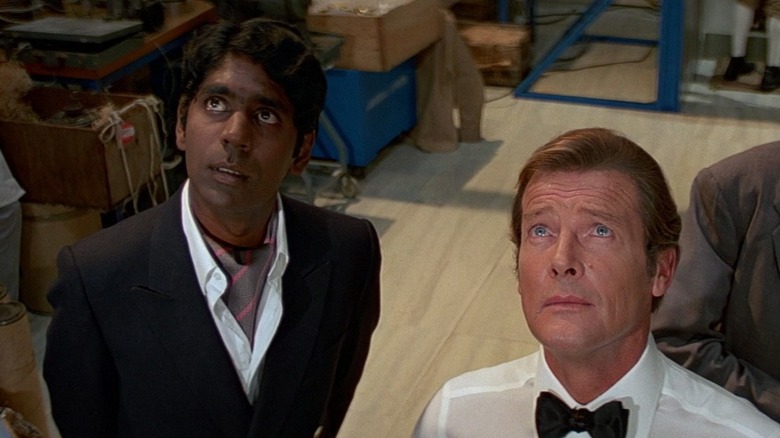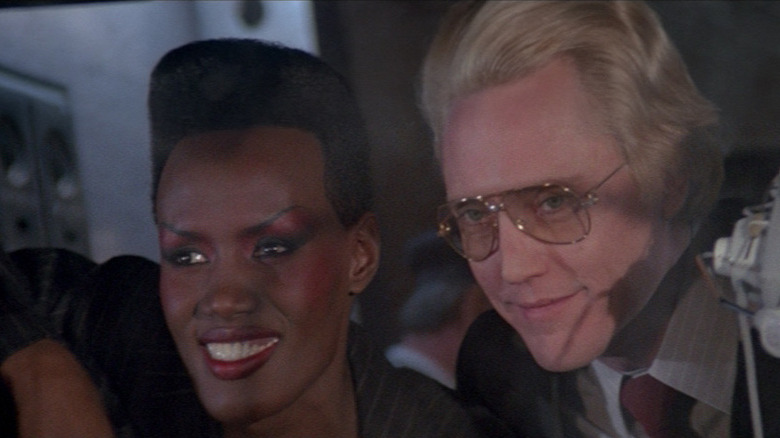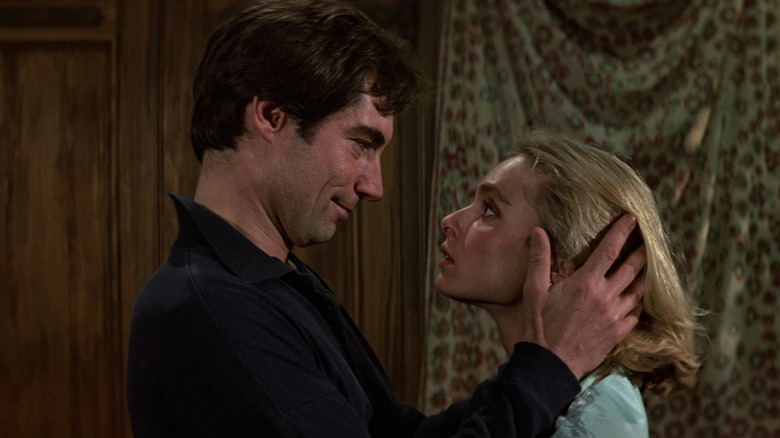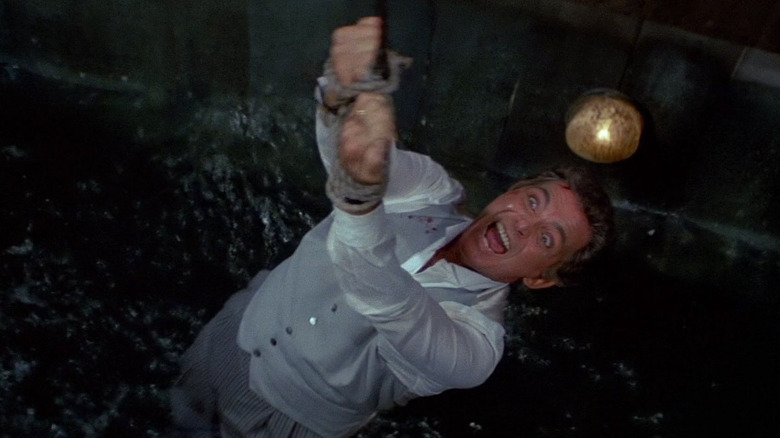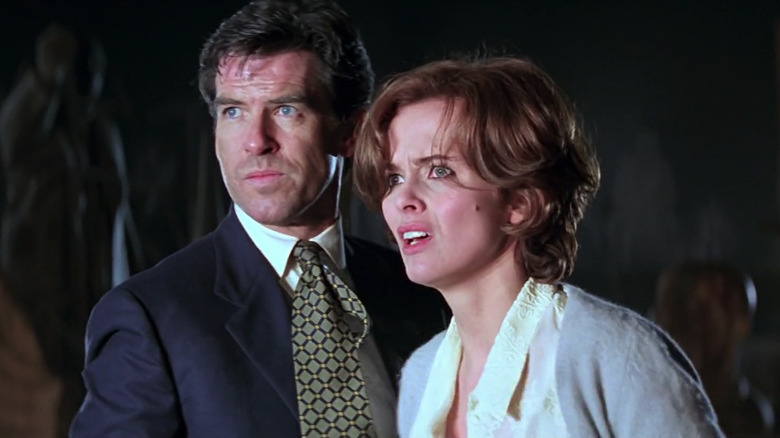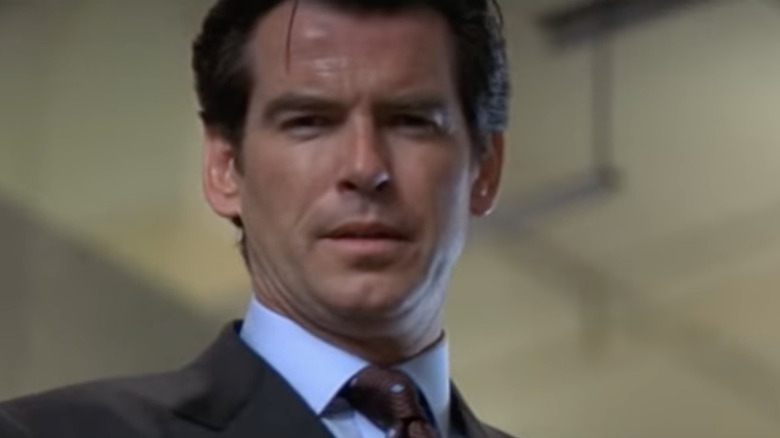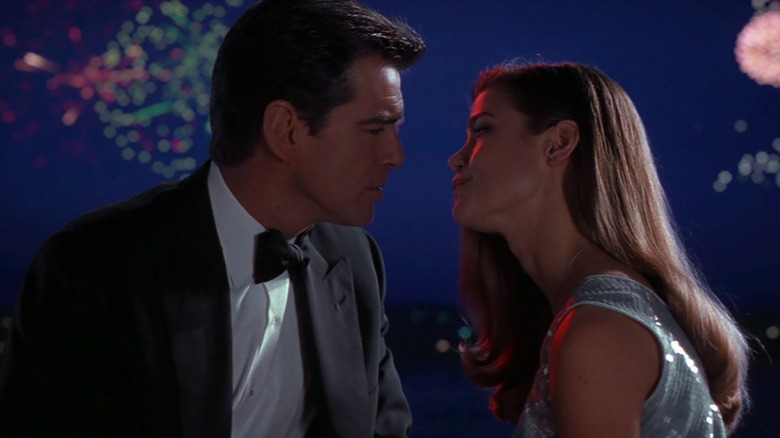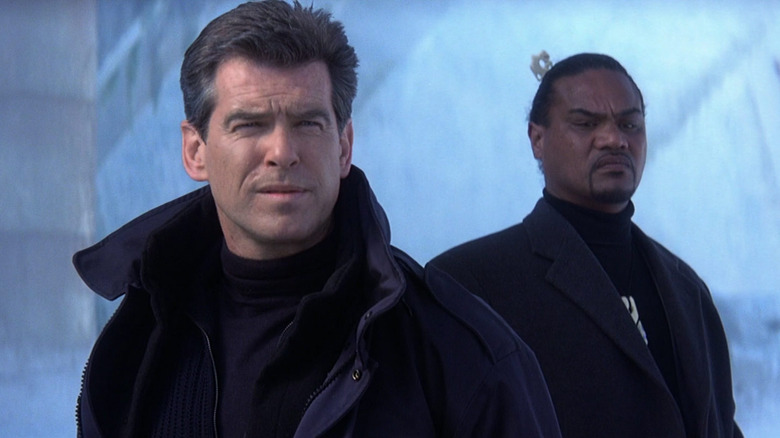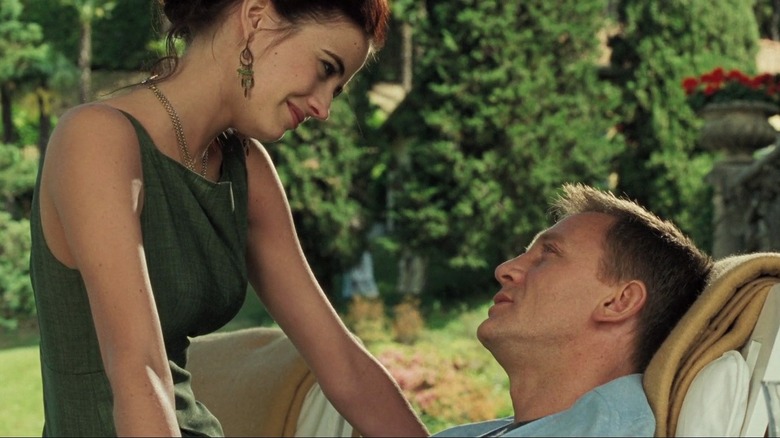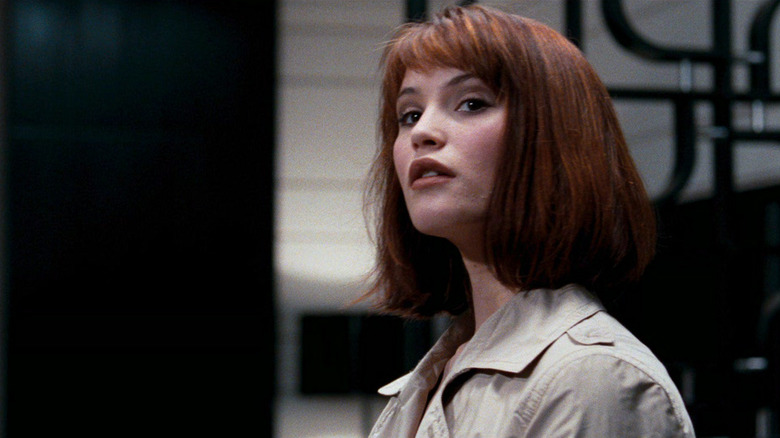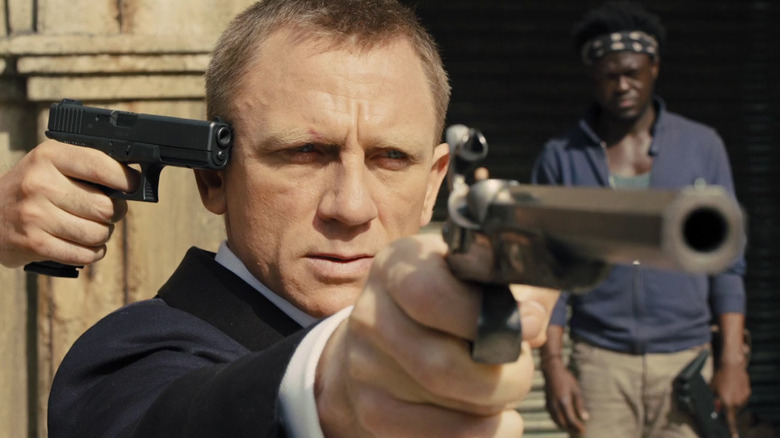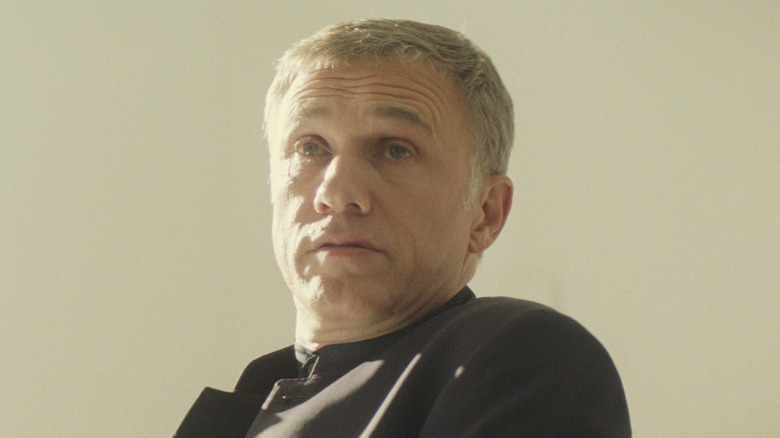The Dumbest Line In Every James Bond Movie
The James Bond film series is one of the longest-running franchises in cinema and has carried a variety of tones throughout its 50-plus-year life span. Some Bond films are grim and violent; others are campy and unpretentious. Most lie somewhere in between.
While the series has created enduring classics from across that spectrum, each installment has at least a little dialogue that's somewhat cringe-inducing. This might come in the form of one of Bond's trademark post-mortem puns, a weird line of exposition, or just a character saying something truly stupid.
We've cataloged some of dthe dumbest lines from every film in the EON Productions James Bond canon, some of which you'll probably have guessed, and others you might find shocking. Positively shocking.
Dr. No's troops will be back to kill you later
In James Bond's 1962 cinematic debut, "Dr. No," Bond and his companions Honey Ryder and Quarrel are caught investigating the strange happenings on Crab Key, an island that's home to the villain's secret base. A small patrol boat sees Bond, Honey, and Quarrel take cover behind a sandbar on Crab Key's beach, and open fire with a minigun. The sand protects our heroes from harm, but they're totally pinned down. Over a megaphone, the leader of the patrol orders that they reveal themselves. When they fail to comply, the patrolman says:
"All right, then. We'll be back! We'll be back with the dogs!"
The boat motors away, not only giving the intruders time to escape but informing them exactly how they plan to come after them next time. By the time the patrol comes back on land with the aforementioned hunting dogs, Bond, Honey, and Quarrel have already used the nearby stream to hide their scent. Dr. No might have been a genius, but his crew certainly wasn't.
Mortal enemies instantly make peace in From Russia With Love
In 1963's "From Russia With Love," James Bond is sent to Istanbul to await a rendezvous with a supposed Soviet defector. While in town, his contact, Ali Kerim Bey, brings Bond to hide out in a Romani settlement, where a pair of women participate in ritual combat to determine which of them will get to marry the village chief's son. The two women are clearly set on killing each other before the duel is interrupted by an attack from enemy agents. After the battle, Bond cashes in a favor, asking the chief to cancel the "girl fight." The chief finds an equally stupid way to resolve the triangle. Ali Kerim Bey translates for Bond:
"Vavra said for you to decide. So decide! They're both yours!"
Into Bond's tent enter both women, side by side, apparently over their murderous hatred for each other and prepared to hop into bed for a threesome with a man they've never met. In a Bond installment that's yet to introduce the series' most outlandish gadgets and gimmicks, moments like this break all semblance of plausibility.
Bond has an old man's musical taste in Goldfinger
In "Goldfinger," James Bond is settling in for the night with Jill Masterson, whom he's recently turned against her villainous employer. On his way back to bed, he realizes that the bottle of champagne he'd had on ice for the occasion has gone warm, and goes to fetch another from the fridge. Says Bond:
"My dear girl, there are some things that just aren't done, such as drinking Dom Perignon '53 above the temperature of 38 degrees Fahrenheit. That's just as bad as listening to the Beatles without earmuffs!"
In 1964, it was totally in character for an older chap like Bond (seen here in his mid-30s) to mock the Fab Four, who had become globally ubiquitous in the past few years. In fact, at the time, this probably made Bond sound cool, too much of a man's man to fall for the pop sensation that had teenage fans screaming the world over. More than half a century later, the Beatles are still celebrated musical legends, making Bond sound like an out-of-touch old crank. Adding insult to injury, former Beatle Paul McCartney and his band Wings were commissioned to create the theme to another Bond film, "Live and Let Die," nine years later.
Bond delivers a pun to a grieving Domino in Thunderball
James Bond is famous for making eye-rolling puns in all sorts of serious situations, particularly right after he's killed somebody. Often, these puns are heard by no one but the audience as Bond coldly amuses himself. In the 1965 film "Thunderball," Bond delivers this pun after killing one of the villainous Largo's henchman Vargas with a harpoon gun:
"I think he got the point."
This pun isn't one of his sharpest, but it also comes at a weird time, about a minute after Bond has informed a woman of her brother's murder. The woman, Domino, has just agreed to help Bond exact vengeance against her brother's killer when Vargas appears over Bond's shoulder. Domino warns Bond and he kills Vargas, saving both their lives, but his post-mortem joke lands with a thud on the grieving sister. Read the room, Mr. Bond!
Bond gets an awful disguise in You Only Live Twice
In 1967's "You Only Live Twice," MI6 fakes the death of James Bond so that he can go undercover and determine who has been snatching American and Soviet space capsules out of orbit. The trail leads Bond to Japan, where he and Japanese secret agents Tiger Tanaka and Aki help him find the villain's base. The base is hidden inside an inactive volcano near a fishing village, and Tanaka suggests that Bond embed himself there in advance of their attack.
"But first," says Tanaka, "you must become Japanese."
What follows is laughable, as Bond is brought to a laboratory where technicians apply a very scientific disguise meant to help Scottish actor Sean Connery pass for Japanese, consisting of a black wig, false eyelids, and a thorough chest waxing. This effort would be offensive regardless of how convincing it is, but as it stands, Bond passes more easily as a Vulcan from "Star Trek" than he would as a Japanese man.
The new Bond breaks the fourth wall in On Her Majesty's Secret Service
The sixth film in the EON Productions Bond series, "On Her Majesty's Secret Service," is the first to recast the lead role, with Australian model George Lazenby replacing the incredibly popular Sean Connery. In the teaser for "OHMSS," the new Bond is introduced while preventing a young woman from drowning herself in the ocean, after which he's attacked by a group of armed men. He defeats his assailants while the woman drives off, never acknowledging him. Bond then says to himself, before a brief glance at the camera:
"This never happened to the other fella."
This line is the only acknowledgment in any of the EON Bond films that there's been more than one James Bond, inspiring a fan theory that James Bond is a codename, not a person. This theory is contradicted within this very film when Bond, facing retirement, cleans out his desk at MI6 and reflects wistfully on artifacts from his previous movie adventures. As far as Lazenby's character is concerned, there is no "other fella," and this Bugs Bunny-style wink does nothing but prompt the audience to reject him as an imposter.
Bond makes a lame excuse in Diamonds Are Forever
"Diamonds Are Forever" is a quirkier, campier Bond film than any of its predecessors, so it's no surprise that Bond comes across as a little less cool and a little more playful. Midway through the film, Bond (a returning Sean Connery) finds himself trapped inside a utility pipeline under construction and makes conversation with a rat who is stuck there with him. When an automated inspection machine races through the pipeline, threatening to shock or impale him, Bond disables it, prompting a pair of engineers above to unlock a hatch to the surface. The tuxedo-clad Bond pokes his head out of the pipeline and tells the technicians:
"Thank you very much. I was just out walking my rat and seem to have lost my way..."
An earlier Bond film, more interested in preserving Bond's suavé, would probably have reduced this to a simple "Pardon me, gentlemen," and then showed Bond confidently exiting the scene to the puzzled astonishment of any witnesses. Instead, Bond remains halfway in the hatch, scanning the horizon like a gopher. We certainly don't mind when Bond is silly, but this feels out of character for the Connery incarnation of the character.
Live and Let Die introduces the franchise's dumbest character
1973's "Live and Let Die" is not only the debut of Roger Moore as James Bond, but also that of a new recurring side-character: J.W. Pepper, the Sheriff of a rural parish in Louisiana. Pepper is a buffoonish caricature of an ignorant, racist cop from the American South who bumbles his way into the periphery of Bond's conflict with Mr. Big. Pepper tries and repeatedly fails to put a stop to a boat chase between Bond and Mr. Big's troops, leading him to bellow the following to his colleague:
"Now you listen to me, trooper boy! We got a swamp full of Black Russians drivin' boats to beat the band down here!"
Pepper, dumb as a rock, has nonsensically determined that the Soviets must be involved in the rampage. After all, it must be something big to get one over on ole J.W.!
The Man With the Golden Gun's theme song lacks poetry
The James Bond series is celebrated for its memorable opening title songs, which typically sport lyrics that reflect the themes of the film, convey the perspective of one of the characters, or vaguely foreshadow the plot. "Vaguely" is the operative word here — note how the song "Skyfall" doesn't spend a verse describing the floor plan of the titular Scottish estate, and how the character of Auric Goldfinger does not have a literal Midas Touch. The title song for "The Man With the Golden Gun" follows the "Goldfinger" tradition of describing the film's villain, but does so very literally:
"He has a powerful weapon
He charges a million a shot
An assassin that's second to none
The man with the golden gun"
It gets worse from there, about as artful as your average limerick. The lyrics of "The Man With the Golden Gun" are more embarrassing and blunt than any line of dialogue in the movie, and this is the film that includes the nonsensical return of Sheriff J.W. Pepper.
The Spy Who Loved Me has a sight gag that's too fast to see
Bond films traditionally include a scene in which 007 takes a tour through the laboratories of Q Branch, where he'll comment on the outlandish gadgets and toys being developed there. Usually, these jokes are total softballs, funny because they're so Dad joke-level obvious. But in "The Spy Who Loved Me," Bond makes a quip about a gadget that totally whiffs, in part because it's not clear what it is he's joking about. He and his Soviet counterpart Anya Amasova briskly walk past an item that appears to be a saddle, from which a three-foot blade suddenly extends upward as if to pierce its rider from below. Bond remarks:
"That'll bring tears to your eyes."
...Yes, it would? This particular gadget commentary seems so detached from the specific item to which it refers that it makes us question whether we've even identified the gadget properly. We've watched this clip over and over and it doesn't make any more sense than the first time.
Bond quotes a classic in Moonraker
Sometimes a movie presents you with a joke that's such a throwaway that you can only imagine the writer just gave up. In "Moonraker," Bond gets into a fight with Chang, an aikido master. The fight ends with Chang plummeting to his death, interrupting an outdoor musical performance when his body crashes through a grand piano. From above, Bond quips:
"Play it again, Sam."
Bond is referencing the famous (and inaccurate) quote from the 1942 film "Casablanca" because that scene has a piano in it. We guess. It's a bit of a stretch. If the band downstairs had been playing "As Time Goes By," maybe he'd have been onto something.
An iconic villain meets an undignified end in For Your Eyes Only
After losing their legal battle with Kevin McClory, who collaborated with Sir Ian Fleming on the story for "Thunderball," EON Productions no longer had the right to use the classic Bond villain of Ernst Stavro Blofeld. This would allow McClory to produce his own remake of "Thunderball," "Never Say Never Again," a rival Bond film that would open opposite "Octopussy" a few years later. Ahead of this, and as a "screw you" to McClory, "For Your Eyes Only" opens with a teaser in which Bond kills a bald, cat-stroking villain who is heavily implied to be Blofeld. Before Bond drops Legally-Not-Blofeld to his death in an industrial smokestack, the nameless baddie begs for his life:
"Mr. Bond! We can do a deal! I'll buy you a delicatessen! In stainless steel!"
Not only is this an ignominious ending to one of the most famous supervillains in cinema, but it's also complete nonsense. On top of that, it's a totally petty act, the producers of EON Productions (namely head honcho, Albert 'Cubby' Broccoli) punching down at an author whose meager victory over EON barely made a scratch against their fortunes.
Bond hams it up for company in Octopussy
Roger Moore's Bond is perfectly content to make cute little quips just to himself, but he's always delighted to have an audience. In "Octopussy," Bond visits a Q Branch satellite office in India with his local contact, Vijay. Unlike most of the people who are subjected to Bond's jokes, who tend to bear them with a straight face, Vijay is a smiling, receptive audience, which only encourages Bond to stretch his jokes further and further. For instance, when Q demonstrates a pen that ejects a corrosive acid, Bond says with a smile:
"Perfect for poison pen letters."
This gets a quiet laugh from Vijay, which spurs Bond on to make a few more goofs. Don't encourage him, Vijay!
Mayday and Zorn clumsily drop the title of A View to a Kill
The titles of James Bond films are often derived from Ian Fleming's original Bond novels and short stories, even when the plots of the films themselves bear no relation to their namesakes. Bond screenwriters also have a habit of trying to squeeze the title into dialogue, no matter how awkward that effort might be. The 1985 film "A View to a Kill" features what may be the most shoehorned title drop in the history of the film series. Evil industrialist Max Zorin has just ordered his lieutenant May Day to drop an uncooperative business partner out of their airship to his death. Observing the San Francisco Bay below, May Day and Zorin share this exchange:
"What a view..."
"...To a kill."
Congratulations, you did it! Thankfully, this kind of thing went out of style before we got to "Quantum of Solace."
Bond gets confused about languages in The Living Daylights
Timothy Dalton's underrated run as James Bond began in 1987 with "The Living Daylights," in which 007 and cellist Kara Milovy find themselves in Afghanistan fighting alongside the Mujahideen. While preparing for the final confrontation with an American arms dealer and his Soviet business partner, Bond calls Milovy "Khaista."
"'Khaista.' It means 'beautiful' in Afghan."
There is, in fact, no language called "Afghan." "Khaista" is a Pashto word, and while it is one of Afghanistan's two official languages (along with Dari), it's unlikely that a worldly secret agent like Bond would mess up a detail like that. Unless, of course, he was dumbing it down to an audience who wouldn't know the difference.
One agent in Licence to Kill should lose his job
In "Licence to Kill," Bond's friend and CIA counterpart Felix Leiter is captured by drug lord Franz Sanchez, who dips Leiter waist-deep into the home of a hungry shark. Bond finds Leiter with his leg and part of his arm severed and a sign around his neck that reads, "He disagreed with something that ate him." When the American investigators arrive, one of the agents examines Leiter's wounds and says with no irony:
"You can bet it was a chainsaw."
Everyone else in the film recognizes Leiter's wounds as being the result of a shark bite, but not this guy, who is evidently the official word on the subject. This mistake is the first indicator that Bond will have to go rogue if he's going to get his revenge against Sanchez.
Bond should have bailed out on this joke from Goldeneye
In "Goldeneye," Pierce Brosnan's 1995 Bond debut, 007 wakes up from a knockout dart and finds himself tied to the pilot's seat of an experimental helicopter. At the urging of his fellow captive, Natalya Simonova, Bond affects their escape by bashing his head against the "Eject" button on the helicopter's canopy, launching the cockpit into the sky moments before the rest of the helicopter is destroyed by its own seeker missiles. After he lands, Bond quips:
"The things we do for frequent flyer mileage."
This is a scenario with plenty of joke potential — it's an escape via head injury! — and yet Bond completely blows it, unfortunately setting the tone for a lot of the Brosnan Bond's cornball dialogue.
Bond stops the presses in Tomorrow Never Dies
"Tomorrow Never Dies" pits 007 against a mad media baron who tries to start World War III to boost sales and ratings for this news conglomerate. During his investigation, Bond punches a henchman off of a catwalk into the spinning, crushing wheels of a massive newspaper printing press. The machine begins spitting out spools of newsprint stained with the man's blood, and Bond remarks:
"They'll print anything these days."
Honestly, this is not so bad. "Tomorrow Never Dies" is a totally medium movie and this is, fittingly, a very medium joke from James Bond. ("And they say communists don't know how to have fun" is a close runner-up).
Bond and Dr. Jones share some holiday cheer in The World Is Not Enough
When James Bond meets nuclear physicist Dr. Christmas Jones midway through 1999's "The World is Not Enough," she warns him "Don't make any jokes. I've heard them all." Bond actually manages to bite his tongue until the end of the film, which closes with him in bed with Dr. Jones and saying:
"I thought Christmas only comes once a year."
Sigh. Oh, James.
Meet Mr. Kil in Die Another Day
"Die Another Day" is an absolute treasure trove of bad puns. Bond spends much of the film paired with a new American counterpart, Giacinta "Jinx" Johnson, who shares his love for the double-entendre, which means twice as many corny quips. We could fill an entire article with just the juvenile sex jokes from "Die Another Day." And yet, the dumbest lines in the film don't involve Jinx at all and are totally PG. It comes when Bond pulls his car up to villain Gustav Graves' ice palace and is greeted by Graves' hired muscle:
"I'm Mr. Kil."
"Well, there's a name to die for."
Ridiculous names for villains and love interests are nothing new to the James Bond series; in fact, they're part of the charm. Still, "Mr. Kil" is about low-effort as it gets. Puzzlingly, neither Bond nor Jinx takes a second crack at a "Kill" pun after Jinx fires a laser through Mr. Kil's head. What an awful joke, and not enough of it!
Bond's charm gets just a little too boyish in Casino Royale
In truth, it was a challenge to pick out a dumb line from "Casino Royale," the practically flawless 2005 film that rebooted the James Bond franchise with new star Daniel Craig, but we did finally pick one. Towards the end of the film, Bond is recovering from torture at the hands of Le Chiffre, and being tended to by his new love Vesper Lynd (portrayed by Eva Green). Vesper wakes Bond in his wheelchair, telling him that the way he looks at her makes her feel "reborn." Bond replies:
"If you'd just been born...wouldn't you be naked?"
Craig and Green sell this dialogue with phenomenal chemistry and sincerity, but boy does it look goofy on paper.
Bond puts zero effort into a seduction in Quantum of Solace
Even in the world of the films, James Bond's reputation for promiscuity precedes him. In "Quantum of Solace," Bond whisks MI6 operative Miss Fields off to a fancy hotel. Barely 10 seconds after the porter has left them alone in their suite, Bond wanders into the bedroom and says:
"I can't find the, uh, stationery. Will you come and help me look?"
To which Fields sighs to herself, as if to say, "What am I gonna do, not bang James Bond?" It's the least amount of effort the modern Bond ever puts into wooing someone into bed, but at least everyone seems as if they're in on the joke.
Bond is cold as hell in Skyfall
In the 2012 film "Skyfall," Bond is held captive at Raul Silva's secret island headquarters. There, Silva forces his representative, Sévérine, to stand with a shot glass of whisky perched on her head and challenges Bond to shoot the glass with an antique pistol. This is Silva's attempt to punish Sévérine for bringing Bond to the island, and to intimidate Bond, whose aim with a pistol was recently fouled up by a traumatic injury. After Bond misses his shot, Silva shoots Sévérine squarely in the chest. Naturally, the shot glass tumbles. Silva declares victory, to which Bond replies:
"It's a waste of good scotch."
Bond covering his anger with a quip is not out of character, but putting a joke at this beat in the film is pretty uncomfortable, particularly given that the previous 10 minutes of the film established how tragic and terrifying Sévérine's life had been up to this point. It feels particularly cruel to ask the audience to laugh just seconds after the death of a character we'd been brought to sympathize with, and not the smartest move on the part of the storytellers.
Spectre's villain reveal adds nothing
In 2015, "Spectre" reintroduced the criminal organization of the same name into the rebooted James Bond continuity. Naturally, the return of Spectre also meant creating a new version of its infamous leader, Ernst Stavro Blofeld. Christoph Waltz was cast as the film's villain, "Franz Oberhauser," a figure from Bond's past, but absolutely no one was surprised when "Oberhauser" tells a captive Bond that he's taken on a new name:
"The man you are talking to now, the man inside your head, is Ernst Stavro Blofeld."
The Blofeld reveal adds absolutely no value to the film. The name means nothing to this version of Bond, who's never heard it before, nor have viewers who have only seen the most recent films. If you're a longtime fan who is familiar with Blofeld, then it's obvious that Oberhauser would be playing the same role in the new continuity regardless of what he calls himself, so it makes no difference. It's not as if Oberhauser is introduced in any capacity other than the leader of Spectre and the villain of the film, so he might as well have been called Blofeld the entire time.
